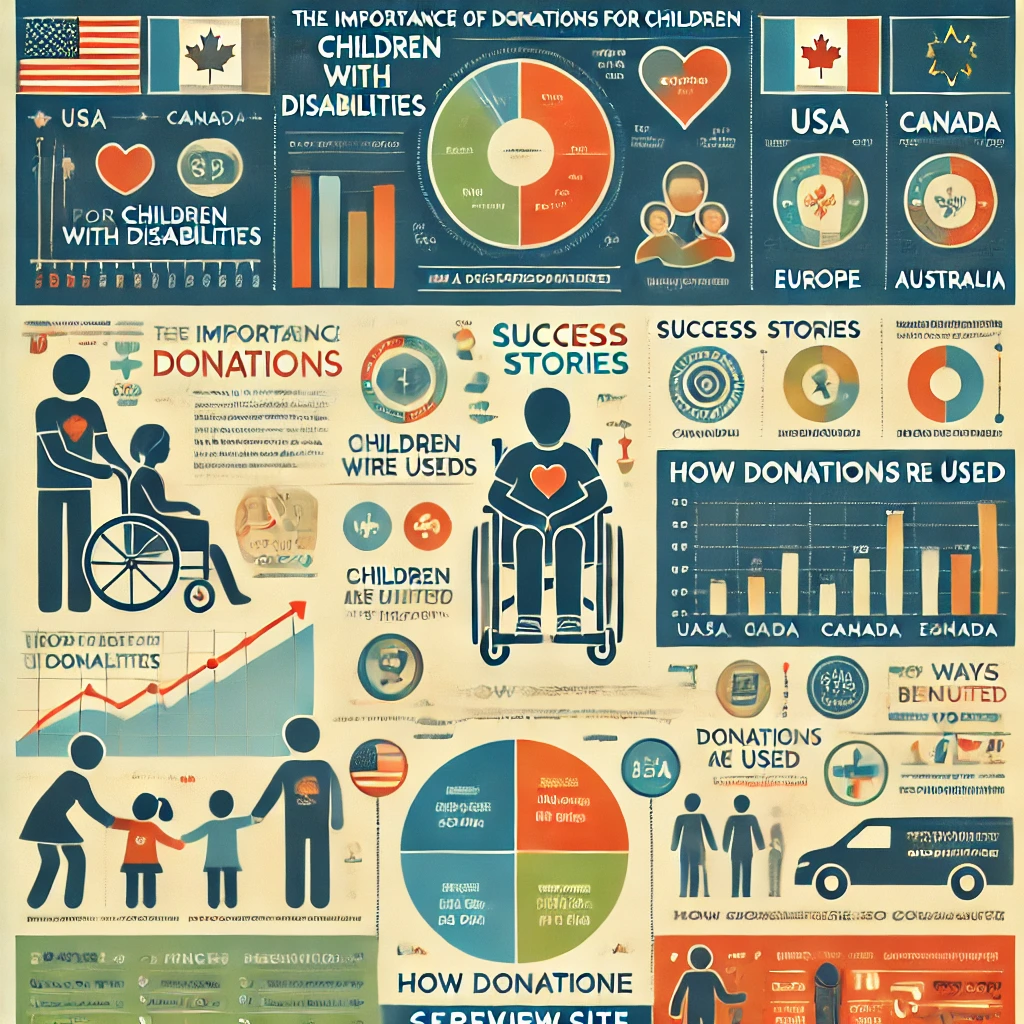Introduction
Children with disabilities often face significant challenges that can impact their quality of life, access to education, and overall well-being. Donations play a crucial role in providing support, resources, and opportunities for these children and their families. In 2024, understanding the importance of charitable contributions and how they can positively affect the lives of disabled children is more critical than ever. This article explores how donations can make a meaningful difference and how you can contribute in the USA, Canada, Europe, and Australia.
Why Donations Matter for Children with Disabilities
Donations can significantly impact children with disabilities in several ways:
- Access to Specialized Care: Many children with disabilities require specialized medical care, therapy, and support services that may not be covered by insurance. Donations help fund these essential services, ensuring children receive the care they need.
- Educational Resources: Children with disabilities often require additional educational resources, such as individualized instruction, assistive technology, and specialized equipment. Donations can help provide these tools, enabling children to thrive in educational settings.
- Recreational Opportunities: Many organizations use donations to create inclusive recreational programs that allow children with disabilities to participate in sports, arts, and social activities, promoting physical health and emotional well-being.
- Family Support Services: Donations can fund support programs for families, offering resources, respite care, and counseling services to help them navigate the challenges of raising a child with a disability.
How Donations Are Used
When you contribute to organizations that support children with disabilities, your donations can be allocated in various ways, including:
- Medical Assistance: Funding therapies, surgeries, and medical equipment that improve the quality of life for children with disabilities.
- Scholarships and Grants: Providing financial assistance to families seeking specialized education or training for their children.
- Community Programs: Supporting inclusive recreational and social programs that encourage interaction and engagement among children with and without disabilities.
- Advocacy and Awareness: Funding initiatives that promote awareness and advocate for the rights of children with disabilities at local, national, and international levels.
Organizations to Consider for Donations
1. USA: Make-A-Wish Foundation
The Make-A-Wish Foundation grants wishes to children with critical illnesses, providing them with unforgettable experiences and hope during challenging times.
2. Canada: The Ontario Federation for Cerebral Palsy
This organization offers support and services for individuals with cerebral palsy and their families, including advocacy, resources, and community programs.
3. Europe: European Disability Forum (EDF)
The EDF is an umbrella organization that represents the interests of people with disabilities across Europe. Donations help promote inclusion and equal rights for disabled individuals.
4. Australia: Cerebral Palsy Alliance
This organization provides support, therapy, and education for children with cerebral palsy and their families, offering a wide range of programs designed to improve their quality of life.
Ways You Can Contribute
- One-Time Donations: Make a direct financial contribution to organizations that support children with disabilities. Every dollar counts and can make a significant impact.
- Monthly Giving: Consider setting up a monthly donation to provide ongoing support to your chosen organization.
- Fundraising Events: Participate in or organize fundraising events, such as charity runs, auctions, or bake sales, to raise awareness and funds for children with disabilities.
- In-Kind Donations: Donate items such as toys, books, or adaptive equipment that can benefit children with disabilities and their families.
- Volunteer Your Time: Offer your time and skills to organizations that support children with disabilities. Volunteering can provide direct assistance and also help raise awareness of the challenges these children face.
Conclusion
Donations play a vital role in improving the lives of children with disabilities in the USA, Canada, Europe, and Australia. By providing access to essential services, educational resources, and recreational opportunities, donations can make a profound difference in the quality of life for these children and their families. In 2024, let us commit to supporting organizations dedicated to helping children with disabilities, ensuring they receive the love, care, and opportunities they deserve.




